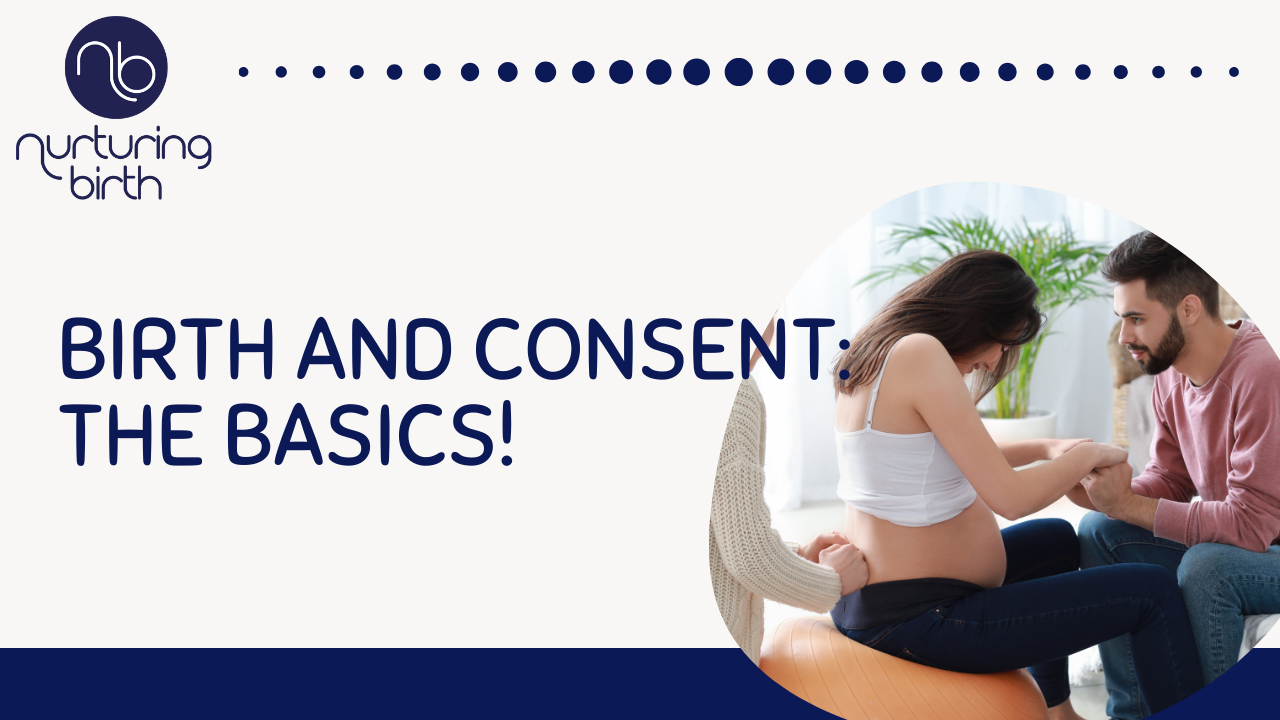
Birth and Consent: The Basics!
Feb 05, 2020Your baby… Your body… Your decisions!
When we’re pregnant we are offered so many tests and checks, we’re poked and prodded and our bellies are listened to. We’re even told to “leave our dignity at the door”.
But did you know that you have the absolute right to decide what happens to your body? Did you know that it’s only you who gets to decide whether you have any of the tests, checks or interventions that are offered in pregnancy and while giving birth? Did you know that they are an option, even if they’re not presented to you in that way?
If you’re told that you “have to” do something or you’re “not allowed” to do something, remember that they can’t allow you any more than you can allow them. If you are told what to do, try to change it in your head from, “do this” to “I’m suggesting that you do this and you’re welcome to ask me more about it if you wish, before making your own decision.”
Making your decisions about tests in pregnancy
You have the right to ask as many questions as you want to before you make a decision, and often this is necessary as some of the decisions we need to make are complicated, and need serious thought about the pros and cons. In many cases, it isn’t solely about taking the test, it’s about what the consequences may be, of how your care may change, if you take it and you’re diagnosed with whatever they are testing for.
So let’s look at some of the questions that you might want to consider asking your midwife or doctor, to help you to get the information you need to be able to make an informed decision.
- What are the benefits and risks of the test itself?
- If I am diagnosed, what will the treatment options be?
- What changes to care would be recommended, if any, and why?
A commonly used acronym that can also help is “BRAIN”:
B – Benefits
R – Risks
A – Alternatives
I – What does your Intuition say?
N – What happens if you do Nothing?
You have the right to have as much time as you need to make your decision, even if this means another appointment to talk it through again. Usually you can go away to think about it and come back when you’re ready, if you choose to.
Making your decisions about labour
A common decision that many pregnant women and people have to make is whether or not to accept the offer of an induction at the end of pregnancy. Inductions are not a risk-free process, and this should be explained to you before you decide whether or not to accept one. Unfortunately, as induction has become more common, there is often little time allocated to explaining the risks and benefits, and yet without knowing all of this information the health care providers are not fulfilling their legal duty to obtain informed consent for the intervention. In fact, they are obliged to ensure that you have this information, and it must be unbiased, and where possible, evidence-based. If the advice that they are giving is not based on evidence, but their own opinion or something else, this must be made clear.
If you feel that you don’t have the information that you need to make your decision, you have the right to spend the necessary time with your doctor or midwife until you do. This might not be possible in one appointment but you should be given an additional appointment for as detailed a discussion as you wish. When you make your decision, it must be respected.
Making decisions while in labour
While you are in labour, it is sometimes harder to make decisions and for this reason it can be very valuable to think through in advance what you would or wouldn’t want to accept. One important decision is how you feel about vaginal exams. They are not compulsory. Nobody can put their fingers in your vagina without your consent, at any time, ever, and this doesn’t change during birth. Other common interventions include monitoring your baby’s heartbeat, and you might want to find out about options for pain relief and what the pros and cons are of each type on offer at your chosen place of birth.
During your labour, whether you’ve investigated something thoroughly or something completely new comes up, you still have the right to make your own decision about whether or not to accept it. If you want more information to make that decision you can ask for it.
How can a doula help with your birth rights?
While it’s helpful to know that you can ask for more information, not all midwives and doctors are helpful, and sometimes they can feel challenged, and become defensive or dismissive. The situation can sometimes feel confrontational, and that can be very upsetting for many people.
Doulas can be excellent mediators. They can take away the confrontation and instead support positive communication, helping you to ask the questions you need, and suggesting questions that you may not have thought of. Although doulas can’t give medical advice, they can signpost you to information that you may not have been given. They can remind you that you have rights, and encourage you to recognise your own empowerment.
A doula can help you to plan your birth and they will have knowledge about the options that you might want to consider in advance which you may not otherwise think of. So many people come out of birth saying, “I wish I’d known XYZ”. Having a doula means that you know more – and knowledge is power.
During your birth, doulas can help you to stay grounded and strong. If you feel that you are being pushed into something that you don’t want, they can be another voice to remind the staff that they need to listen to you. They can help you to remember what you wanted, and support you in that decision, or, if you change your mind, your new decision. Crucially, they can help to facilitate communication if there’s an emergency, helping you to understand what’s going on even if the staff feel too busy to take the time to talk to you properly.
Sadly, many women who have experienced birth trauma say that the trauma came from feeling out of control of what happened to their bodies. By knowing that we are the ones who can make decisions for ourselves, we know that we can insist on that information before we agree to anything happening to us, and that itself can lead to a much higher chance of a positive birth, no matter how it ends up. And, if we want support with that, our doula will be there for us.
Emma Ashworth is a Nurturing Birth doula, a trustee of AIMS and she is currently the AIMS Journal Editor. She has a special interest in consent and has written extensively on women’s rights in birth. Her book, “The AIMS Guide to Your Rights in Pregnancy and Birth” is available from AIMS. You can find Emma at her Nurturing Birth Directory listing here…
With credit to Emma Ashworth- Birth Rights Activist and author of Your Rights in Pregnancy https://shop.aims.org.uk/products/aims-guide-to-your-rights-in-pregnancy-birth
Learn more about the Nurturing Birth Doula Training Experience
Free download available NOW!
We hate SPAM. We will never sell your information, for any reason.


